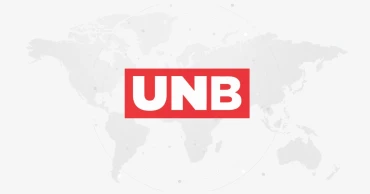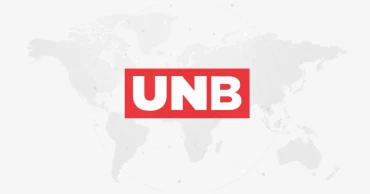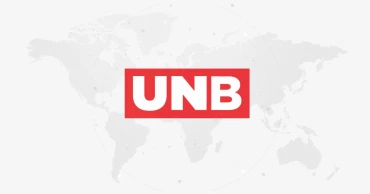electoral process
Very important to see whole picture of electoral process holistically: EU EOM
European Union Election Observation Mission (EU EOM) Deputy Chief Observer Inta Lase on Saturday (January 17, 2026) said it is very important to see the whole picture of electoral process holistically to present their report impartially, stressing that this is a historic moment for Bangladesh.
"Let us observe and let us wait until a holistic assessment is done," she told reporters at a city hotel, noting that they all know there is no perfect election anywhere in the world.
Lase said their assessment and report with recommendations in the spirit of friendship and cooperation will help improve the future electoral process in the country.
She said their observers are very experienced though many of them are coming to Bangladesh for the first time.
EU to allocate €60B military, €30B economic aid to Ukraine
Addressing the observers, Lase said, "You are the ones who are in the field, seeing the realities, telling us here in Dhaka how the situation is unfolding in each and every district. We are really looking forward to your report and assessment from the field."
She said she knows observers' hours on the ground will be longer but it will be rewarding.
"Trust me, we are all very privileged to hear from you and see this historical election," Lase said.
200 Observers Altogether
At full strength the EU EOM will comprise 200 observers drawn from all 27 EU member states, Canada, Norway and Switzerland.
The EU EOM will present its preliminary findings in a statement at a press conference on 14 February in Dhaka.
1 month ago
Which form of govt and electoral process best suits Bangladesh?
Just two months into the interim government, various discussions on electoral reforms, timelines and systems are gaining momentum, yet the voices and preferences of people seem to be lost in the noise.
While one faction advocates for a parliamentary election, others are calling for a proportional representation system. The real question is: which form of government and electoral process best suits Bangladesh?
A large segment of political parties is advocating for national elections to be held using a proportional representation (PR) system instead of the existing method. But the BNP, one of the major parties, opposes this approach and supports the current system.
However, the Awami League's position in the evolving political landscape remains unclear.
But election experts think neither the government, nor the political parties and voters are prepared for its introduction in the next polls.
They say that while the PR system offers many potential benefits, its feasibility depends on strong political will, public support and the readiness of both political actors and the electorate to transition from the current first-past-the-post (FPTP) system.
The experts suggest that the PR system could be incorporated into the constitution as a directive for future implementation, as it may help create a more vibrant parliament with diverse viewpoints, reduce the influence of money and muscle in elections, and prevent autocracy and fascism.
PR, or proportional representation, is an electoral system where the distribution of seats aligns with the proportion of total votes each party receives. For instance, if a party gets 40 percent of the total votes, the PR system would allocate 40 percent of the seats for it in parliament.
“PR is a good election system. I support it and I have even written a book on why it’s necessary for Bangladesh. However, we won’t be able to implement it in the next national election because we’re not ready. Our government, political parties and voters are unprepared for it,” said renowned election expert Dr Tofail Ahmed.
Read more: Bangladesh needs election-time neutral govt for fair polls: Speakers
He noted that around 70 to 80 countries currently practise some form of proportional representation system worldwide. “It’s encouraging that political parties are advocating for the introduction of the system. However, our voters lack knowledge about it. We must first educate them, and this process will take time to ensure people understand it,” he said.
Besides, the election expert said the PR system encompasses various forms and definitions, reflecting different approaches to achieving proportionality in electoral outcomes. “We need a political consensus on which one we will adopt.”
He said that a significant barrier to implementing this system is that major parties may not accept it, as it could disrupt their dominant power and make it more difficult for them to secure a majority.
“The BNP and Awami League are our two main parties, sharing the support of the majority of voters in the country. The BNP is opposing this system, and we aren’t hearing the views from the Awami League due to the current political situation. I believe they may also not support it. Even if Jamaat had a larger voter base, they likely would not back it either,” Tofail said.
He stated that smaller parties are in favour of the PR system, as it would provide them with the opportunity to secure seats that they might not obtain under the existing system.
“So, implementation of this system is very challenging. We should give the political parties time to understand the PR process and its benefits. It won’t be wise to impose by the interim government without political consensus,” Tofail observed.
He said the reform commission on the constitution can propose incorporating a guideline in the national charter for the introduction of the system and its implementation in phases.
The election expert pointed out that the BNP is discussing a bicameral parliament and a national government, which could ensure the participation of people from diverse backgrounds in governance, creating a balance of power and facilitating lawmaking. “We should now focus on these two issues alongside the restoration of the caretaker government.”
BNP seeks election roadmap, new EC based on political consensus
Chairman of the Jatiya Nirbachon Parjabekkhon Parishad-Janipop, Prof Nazmul Ahsan Kalimullah, said the PR system exists in various forms in about 80 countries worldwide, and he has been advocating for its implementation since the 1990s.
He emphasised that it is crucial to convince the major political parties about the PR system. “Otherwise, it won’t be possible to introduce this system in the future.”
Former bureaucrat Abu Alam Md Shahid Khan proposed a mixed electoral system that combines proportional representation (PR) with the existing traditional system by increasing the number of parliamentary constituencies from 300 to 450.
“In that case, the current electoral system could apply to 300 constituencies, while the PR system would be used for 150 constituencies,” he explained.
On October 9, Bangladesh Jamaat-e-Islami presented a 10-point state reform proposal, including the introduction of the PR system.
During a seminar on electoral reform on October 12, Jamaat leader Dr Shafiqul Islam Masud, Ganosamhati Andolan Chief Coordinator Zonayed Saki, Gana Adhikar Parishad President Nurul Haque, Jatiya Party Presidium member Shameem Haider Patwary, and CPB General Secretary Ruhin Hossain Prince all advocated for the PR system. Additionally, some Islamic parties, including Islami Andolan Bangladesh, have also called for its introduction.
Contacted, BNP Secretary General Mirza Fakhrul Islam Alamgir said the PR system is not suitable for Bangladesh. “We won’t support it. This method is not practised in Bangladesh, so there is no question of its application in the next election.”
Read more: In FB post AL accuse interim govt of protecting the criminals
1 year ago
Canada disappointed that Bangladesh’s electoral process has ‘fallen short of’ democratic principles
Canada has said it remains “committed to support” the people of Bangladesh in their aspirations for a more stable, prosperous, and democratic future.
“Fair elections with a viable opposition, independent democratic institutions and freedom of the press are critical to ensuring a strong and healthy democracy,” said the Canadian government in a statement.
Will continue to work with government of Bangladesh on priorities that characterise longstanding relations: EU
Canada expressed its “disappointment” that this electoral process has “fallen short of” the principles of democracy and freedom upon which Bangladesh was founded, and called on the relevant authorities to work transparently with all parties to move forward towards democracy, respect of human rights and fundamental freedoms in line with the interests of the people of Bangladesh.
New Bangladesh Ambassador Rezina Ahmed presents credentials to Portuguese president
Global Affairs Canada on January 9 issued the statement regarding the parliamentary election held in Bangladesh on January 7, 2024.
“Canada commends and supports the democratic aspirations of Bangladeshi citizens and condemns the acts of intimidation and violence that took place ahead and during the elections,” said the Canadian government.
Scottish MP congratulates PM Hasina on re-election, praises election process
The country extended sympathy to all of those who have been affected by the violence that has occurred.
Canada was one of the first countries to recognize the independence of Bangladesh in 1971.
2 years ago
‘Here to listen, support a transparent and inclusive electoral process’: NDI-IRI mission
Former US Assistant Secretary of State for South Asian Affairs Karl F. Inderfurth today (October 08, 2023) said the international community plays an important role in supporting Bangladesh as it prepares for the elections.
“We are here to listen to a variety of actors and show our support for a transparent and inclusive electoral process,” he said as a joint NDI-IRI mission began assessing the status of election preparations.
The team is scheduled to have a meeting with the Ministry of Foreign Affairs at 2:30pm today.
The joint International Republican Institute (IRI) and National Democratic Institute (NDI) pre-election assessment mission arrived in Bangladesh to follow electoral preparations and conduct an independent and impartial assessment.
From October 8 to 12, the six-member delegation will meet with a diverse group of election stakeholders including government officials, political party leaders, election authorities, civil society, and others.
Read: IRI-NDI pre-election assessment mission due to arrive Saturday
The delegation is co-chaired by Inderfurth and Bonnie Glick, former Deputy USAID Administrator; and includes Maria Chin Abdullah, former Member of the House of Representatives, Malaysia; Jamil Jaffer, former Associate Counsel to the President of the United States; Manpreet Singh Anand, NDI Regional Director for Asia-Pacific; and Johanna Kao, IRI Senior Director, Asia-Pacific Division.
“This joint pre-election assessment mission demonstrates our interest and support for democracy in Bangladesh,” said Bonnie Glick.
“We look forward to meeting with key stakeholders and to provide independent, impartial, and timely analysis as the country heads to the polls,” Glick added.
The delegation will conduct its assessment in accordance with the laws of Bangladesh and consistent with the Declaration of Principles for International Election Observation which was signed in 2005 at the United Nations.
Read: Uzra Zeya reiterates USA’s desire to see free, fair election in Bangladesh
Following the conclusion of its activities, the delegation will release a statement of its key findings, analysis of the pre-election environment, and practical recommendations to enhance the credibility of the process and citizen confidence in the elections.
NDI and IRI are nonpartisan, nongovernmental organizations that support and strengthen democratic institutions and practices worldwide.
The Institutes have collectively observed more than 200 elections in more than 50 countries over the last 30 years.
Read more: Australia’s Greens party MPs want free, fair elections in Bangladesh
2 years ago
Govt expects undemocratic forces to refrain from misguided efforts to jeopardize electoral process
The government of Bangladesh has said it expects that the local undemocratic forces that resort to violence, arson and destruction would remain cautious and refrain from their misguided efforts to jeopardize the electoral process as mandated by the Constitution.
It is entirely up to the people of Bangladesh to sustain the hard-earned democratic process, political stability and development gains in the country, said the government in a statement.
Read more: Nothing to worry about new US visa policy; don't want arson, violence: Momen
"The government appreciates that the international community including the US firmly stands by Prime Minister’s sustained commitment to ensure free and fair elections," said the Ministry of Foreign Affairs on Thursday (May 25, 2023) while responding to new visa policy announced by the US government.
The government apparatus will take necessary measures to prevent and address any unlawful practices or interference by any individual, group or entity to compromise the smooth and participatory conduct of the elections, MoFA said.
The electoral process will remain under strict vigilance, including by international observers as accredited by the Election Commission, it said.
Read more: New US visa policy declared targeting next Bangladesh polls
The government of Bangladesh has taken note of the announcement made by the US Secretary of State on a visa restriction policy pursuant to the so-called 3C provision under the US Immigration and Act.
"Bangladesh would like to view this announcement in the broader context of its government’s unequivocal commitment to holding free and fair elections at all levels for upholding the country’s democratic process," MoFA said.
Under Prime Minister Sheikh Hasina’s leadership, Bangladesh remains a democratic and politically stable nation with experience of holding a series of elections at national and local levels, said the government.
Read more: New visa policy to be implemented fairly on govt & oppn: Donald Lu
Since the general elections in 2008, it is evident that the people of the country experienced unprecedented socio-economic development and empowerment due to continued political stability under the Awami League government.
This resulted in the reduction of headcount poverty from 41.5% in 2006 to 18.7% in 2022, and of extreme poverty from 25.1% to 5.6% during the same period.
Now an "international role model" for development, Bangladesh has become eligible for graduation from the UN Least Developed Country (LDC) status by 2026.
These have been achieved due to the Awami League government being elected to office for three consecutive terms over the last fourteen years.
The people of Bangladesh are very much conscious of their democratic and voting rights, MoFA said.
Read more: US govt’s new visa policy does not bother Bangladesh government: Shahriar Alam
There is no precedent for any government to continue in office having usurped people’s mandate through vote rigging, it said.
The people’s right to franchise is considered a State sanctity by the Awami League government that has a political legacy of unrelenting struggles and sacrifice for securing that right.
The government attaches importance to freedom of assembly and association for all peaceful and legitimate democratic processes.
The electoral reform process in Bangladesh continues in a consultative manner involving all concerned stakeholders, MoFA said.
As part of the process, photo-based voter ID cards were issued in response to the 10.23 million fraudulent voters enlisted by the Bangladesh Nationalist Party-led government.
Read more: New visa policy to help PM Hasina's govt in holding fair elections: US
The use of transparent ballot boxes has also been made the norm to establish confidence among the electorate as well as the polling officials and agents.
The National Election Commission continues to be equipped with the wherewithal to carry out its functions in full independence, credibility and efficiency, MoFA said.
The present government took the initiative for the first time to get the Chief Election Commissioner and Other Election Commissioners Appointment Act, 2022 enacted by the National Parliament.
Pursuant to this law, a new Election Commission has been constituted.
Read more: Bangladesh's upcoming national polls will be under AL govt: PM Hasina
As mandated by the Bangladesh Constitution and Representation of the People Order, 1972, the entire executive machinery will remain at the Election Commission’s disposal to assist in the discharge of its responsibilities in a way as it may direct, MoFA said.
2 years ago









